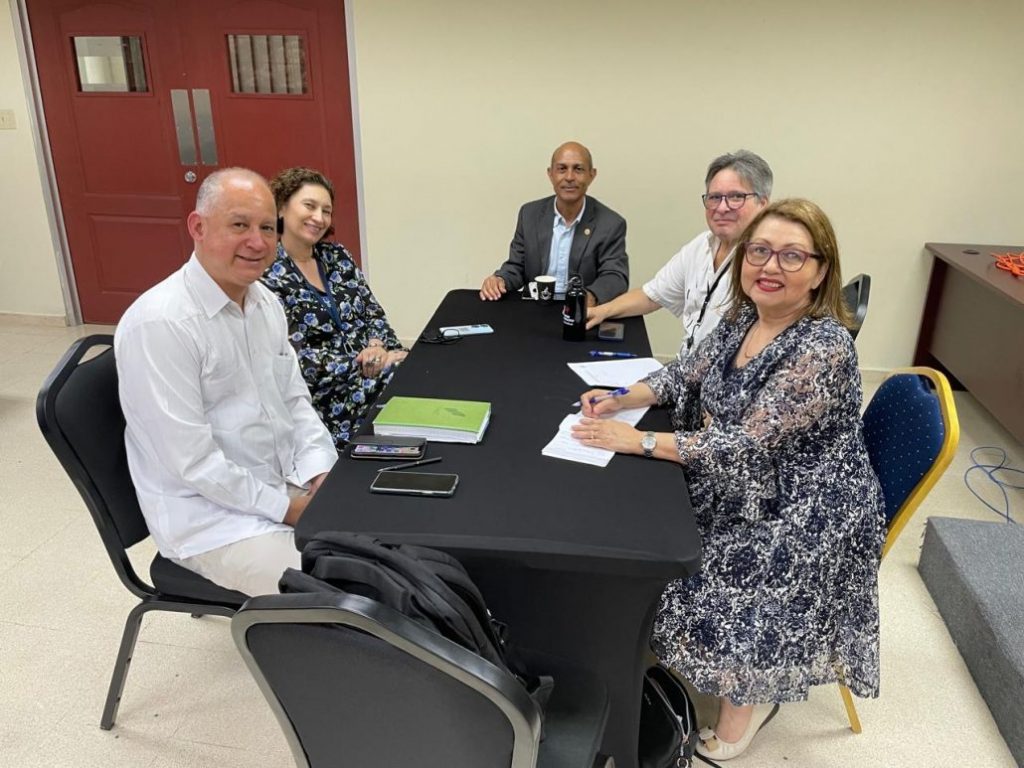Meeting on Semiconductors with Professors from the Technological University of Panama

During a trip to Panama in May of this year, Dr. Ritter Diaz, Director of JAPOLAC, held a meeting with professors from the Technological University of Panama who specialize in semiconductor education. The purpose of the meeting was to exchange opinions on Japan’s strategy to revitalize the semiconductor manufacturing industry. Dr. Diaz also shared details about his recent participation in the launch of the Costa Rica Semiconductor Roadmap.
Dr. Diaz reported that Japan’s strategy aims to revitalize the semiconductor manufacturing industry in order to play a central role in the global semiconductor supply chain. To this end, Japan has allocated financial subsidies amounting to approximately 25 billion dollars (3.9 trillion yen) between 2021 and 2023. This government support has attracted renowned foreign companies in the global semiconductor industry, such as Taiwan Semiconductor Manufacturing Company (TSMC), Powerchip Semiconductor Manufacturing Corp. (PSMC, Taiwan), Samsung (South Korea), Micron Technology (USA), Intel (USA), IBM (USA), Applied Materials (USA), and ASML (Netherlands), among other industry leaders.
Additionally, Dr. Diaz shared details about the launch of the Costa Rica Semiconductor Industry Roadmap. This effort, driven by the presence of Intel and the partnership between Costa Rica and the United States, seeks to diversify and strengthen a more resilient, secure, and sustainable global semiconductor value chain. This partnership is facilitated by the International Technology Security and Innovation Fund (ITSI Fund), created by the 2022 US CHIPS Act. Costa Rica is not only engaged in semiconductor testing, assembly, and packaging, but is also venturing into chip design.
Dr. Diaz noted that Panama, under the educational leadership of the Technological University of Panama and the National Secretariat of Science and Tecnology, has a great opportunity to develop the semiconductor industry. Like Costa Rica, Panama has been included in the partnership with the United States to be part of a stable supply chain in the Latin American and Caribbean region. Additionally, Panama boasts an important international logistics center to support this supply chain, complementing semiconductor production in Costa Rica.
In this regard, he emphasized that Panama must transform the education curriculum to service global semiconductor companies, in the same way as Costa Rica did to attract high-tech companies like Intel. In addition, the educational model should also prepare citizens for communication with machines, including learning the language of artificial intelligence, in addition to their native language, Spanish, and English as an international communication language.
Dr. Diaz reiterated the support of JAPOLAC to the Technological University of Panama to establish links with Japanese institutions and companies related to research and development in semiconductors and other areas of technological development. In this regard, he has already approached the Faculty of Engineering at Chiba University, aiming at the training of professors and students from the Technological University of Panama in the field of semiconductors.
